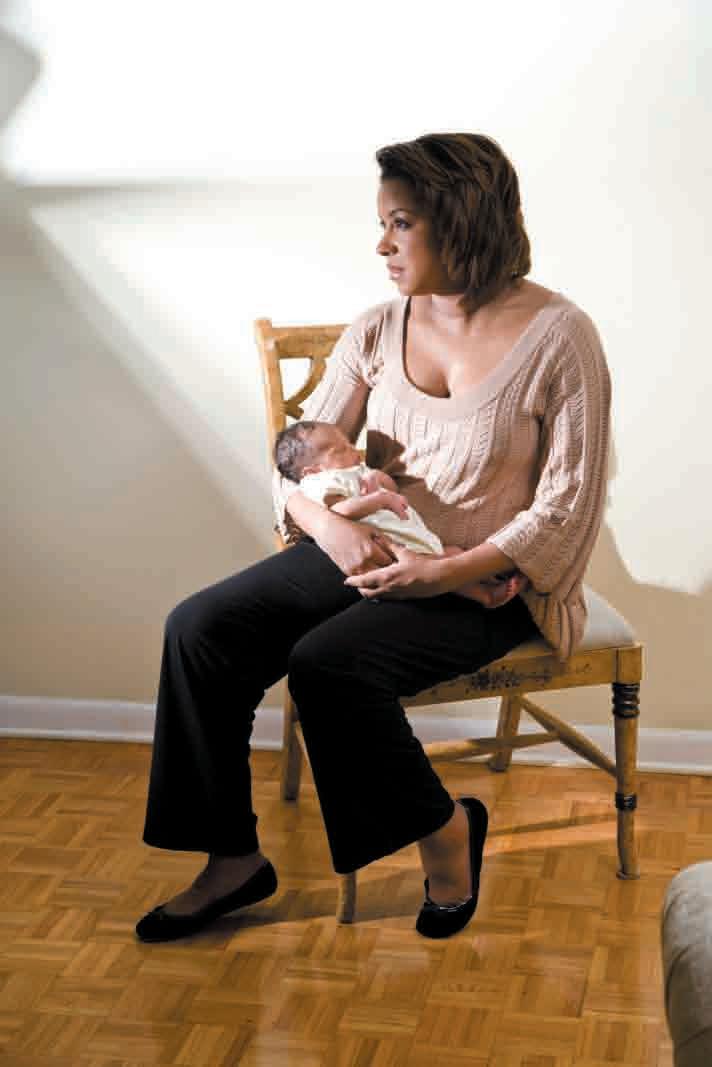
4 minute read
TakinG CaRe of mommy / by Kate Thomas
Taking Care of Mommy
Postpartum depression can make it hard for mom to take care of baby—and herself
Advertisement
by Kate t homas
When a woman has a baby it can trigger many powerful feelings and emotions, ranging from happiness and joy to anxiety and overwhelming fear. It is not unusual for new moms to experience the baby blues, but when these mood swings become longer lasting forms of depression, then it is possible the mom is dealing with postpartum depression (PPD). PPD isn’t a weakness. If anything, it is a complication of childbirth that, with prompt treatment, can be easily controlled. Birdie Meyer, RN, MA, is coordinator of Perinatal Mood Disorders at Indiana University Health and is chair of the Educational Training Committee for Postpartum Support International (PSI). Meyer has 15 years of experience with PPD, also known as a perinatal mood disorder. She says there are many misconceptions about the symptoms of PPD. “Women sometimes think postpartum depression means having horrible thoughts or crying all the time, which is not always true,” said Meyer.
RISK FACTORS
There is no single cause for PPD, and it is not clear why some women may be more vulnerable than others. The current statistics for women who suffer from a PPD stands at 1 in 8 women.
“That means that 800,000 women a year will suffer from a perinatal mood or anxiety disorder,” Meyer said. “That is close to 1 million women a year. Studies have shown that it is 10-22 percent.” Women from every walk of life can develop PPD. Symptoms can begin to develop during pregnancy or in the first 12 months after childbirth. Certain risk factors may increase a woman’s chance of experiencing significant feelings of depression and anxiety during or after pregnancy. Also, women with a personal or family history of depression, anxiety, obsessivecompulsive disorders, panic attacks or post-traumatic stress disorders are at a higher risk. Meyer explained that many women do not even know they have a history. “A lot of people are unaware they have a family history,” Meyer said. “For instance, if you say to someone, ‘Do you have a history of mental health or anxiety issues?’ they will say ‘No! Not that I know of.’ Yet if you ask them if they consider themselves to be a worrier, they may say, ‘Oh yes, I have always been a worrier, my mom was, too.’”
SYMPTOMS
It is important to recognize that the baby blues is a separate issue from PPD. The baby blues only last for a few days to two weeks and can include some or many of the following: mood swings, anxiety, sadness, irritability, crying, lack of concentration or trouble sleeping. “The baby blues is directly caused by the change in hormones, and it only lasts a couple of days to a couple of weeks,” Meyer said. “It is not really a diagnosis as 50 percent to 80 percent of women get a touch of baby blues. If it goes beyond two weeks or you are really devastated, it is not the baby blues.” Other symptoms of PPD include: eating disturbances (overeating or loss of appetite), insomnia, sadness, crying, overwhelming fatigue, lack of interest in sex, and feelings of inadequacy and intense irritability. PPD can also include symptoms of anxiety, which can manifest in a number of ways.
TREATMENT
It is important to seek help from your doctor if you are depressed after your baby’s birth even if you are ashamed, embarrassed or reluctant. The sooner a person treats PPD, the sooner they will recover, be able to bond with their child, and enjoy life with their newborn baby. PPD is typically treated with either counseling or medicine or both depending on the severity of the case. Women with milder symptoms will have a full recovery with therapy alone, but some may need a combination of treatments. It is also encouraged that women suffering with PPD seek as much social support as possible within their local peer groups and become educated. If families are concerned that a new mother may be suffering from PPD, the best thing to do is to be supportive and to approach the topic sensitively. It is important to remember that depression is not anyone’s fault and ignoring it will not make it go away.
PREVENTION
Through education during pregnancy, mothers can prepare for and monitor any signs and symptoms of depression they may experience. The earlier PPD is detected, the earlier treatment can begin.
Always contact your physician if you are feeling the following:
• Are you feeling sad or depressed? • Do you feel more irritable or angry with those around you? • Are you having difficulty bonding with your baby? • Do you feel anxious or panicky? • Are you having problems with eating or sleeping? • Are you having upsetting thoughts that you can’t get out of your mind? • Do you feel as if you are “out of control” or “going crazy?” • Do you feel like you never should have become a mother? • Are you worried that you might hurt your baby or yourself?








